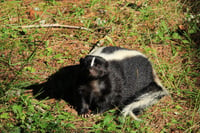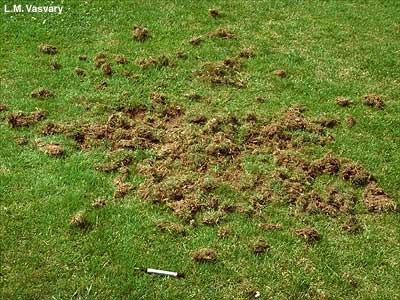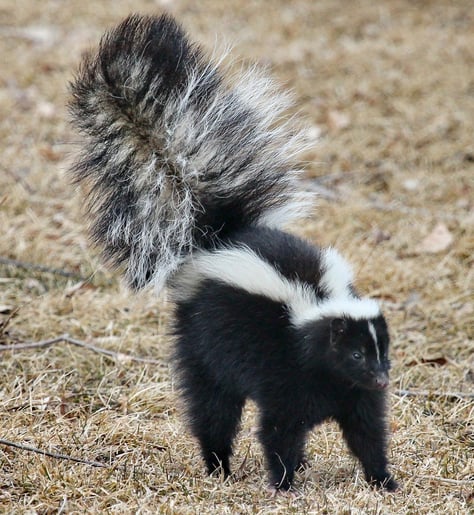Skunk Information for Homeowners in NJ and PA
 Skunks are nocturnal animals that live across the United States as well as in New Jersey and Pennsylvania. You’ve probably never actually seen a live skunk, but you can sure tell when they’re around. The unmistakable odor from a skunk can emanate an average of 1 mile away. These stinky mammals are actually beneficial to reducing the amount of insects and small rodents that live on your property. Problems come into play when skunks create dens under your deck or shed. Digging and foraging for food around your yard can be unsightly, plus the chances for rabies are present.
Skunks are nocturnal animals that live across the United States as well as in New Jersey and Pennsylvania. You’ve probably never actually seen a live skunk, but you can sure tell when they’re around. The unmistakable odor from a skunk can emanate an average of 1 mile away. These stinky mammals are actually beneficial to reducing the amount of insects and small rodents that live on your property. Problems come into play when skunks create dens under your deck or shed. Digging and foraging for food around your yard can be unsightly, plus the chances for rabies are present.
How can I tell if I have skunks?
In the wild, skunks live in dens within fallen hollow logs, brush piles, and abandoned burrows from other animals. If they wander into residential areas, they have been known to create dens under decks and sheds, even falling into basement window wells. They begin breeding in February or March, bearing a litter between early April and late June. Although skunks do not hibernate, they will spend extended periods of time within their den during freezing temperatures. If you’re not out and about at night, there are still ways to tell if there are skunks living on your property. Skunks dig holes in the ground as they search for grubs. You can identify their small holes by their cone shape as seen below.

Pictured Above: Evidence of skunk digging Photo Credit: University of Maryland, College of Agriculture and Natural Resources
In addition to the grubs, skunks behave similar to raccoons, scavenging for food in trash cans with loose lids or through pet food. Torn open trash bags are also an indicator that a skunk could be living nearby. You may think their odor is a dead giveaway, but the scent of a skunk just means one is close by. It’s entirely possible that the scent belongs to a skunk under your deck, but it doesn’t guarantee that it’s living on your property. Their scent can travel very far, and skunks don’t spray often.
Why do I have skunks?
Much like other local wildlife, skunks can live where there is accessible water, food, and shelter. Skunks can travel up to 2 miles away from their den to find water, so just because it’s not on your property doesn’t mean they’ll go thirsty. In terms of food, skunks eat a variety of small insects, baby rats and mice, and low level vegetation. Skunks are poor climbers with bad eyesight, so things that are easier to find on the ground are ideal. A protected space for skunks to create dens is the main reason why they’ve chosen your property. When coming into contact with residential properties, skunks typically can be found under decks or sheds. Sometimes one may wander into a garage if the door is left open overnight or fall into a basement window well, unable to climb back out. For a skunk, there are few predators due to their unique stinky defense mechanism, but that doesn’t mean some animals will try to provoke them. Dens also provide a safe space for skunks to raise their young.
Are skunks dangerous?
Skunks are notorious carriers of rabies. By refraining from handling or touching skunks, you can easily avoid rabies. Rabies is transmitted by saliva, usually via bites, but not through spray. If you or your pet has been bitten by a skunk, seek medical assistance as soon as possible.

Pictured Above: If you see a skunk standing in this posture with its tail erect, you may get sprayed.
The most unpleasant thing about skunks is their distinct smell. The spray that they release is only done as a last resort method of defense when they feel threatened or think that their young are in danger. Because of their poor eyesight, it’s an especially useful way to ward off predators. So why am I smelling skunks if I don’t see them? That’s a great question. Skunks are able to spray up to 10 feet away with accuracy, lingering in the air up to a mile away. On a windy day, you can smell a skunk’s odor downwind nearly two miles away! The upside is that skunk spray is not poisonous or lethal to you or your pets.
How can I prevent skunks?
Follow these top tips for skunk prevention to reduce the likelihood of dens on your property:
- Never leave pet food outside
- Secure trash can lids
- Keep garage and shed doors closed
- Regularly inspect common spots for dens
Cooper Pest Solutions does not currently provide skunk removal services.

